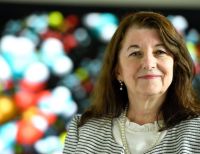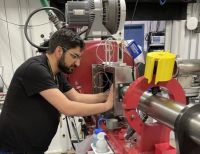- Name
- Hannah Robbins
- [email protected]
The Ralph O'Connor Sustainable Energy Institute (ROSEI), in collaboration with partners from around the globe, has established a new center focused on helping society transition towards 100% renewable energy for power grids.
EPICS—Electric Power Innovation for a Carbon-free Society—involves experts in academia and industry from the United States, the United Kingdom, and Australia, and has been funded for five years by the National Science Foundation (NSF) through its Global Centers Competition Awards. The overseas partners that will lead their respective countries' efforts are Imperial College London (UK) and University of Melbourne (Australia).
Ben Hobbs
Whiting School of Engineering
"I really do believe that having people from different backgrounds is the only way to create a power grid run solely on renewable energy because you have to consider so many different factors."
Led by ROSEI core researcher Ben Hobbs, a professor of environmental management whose research focuses on using analysis and economics to improve electric utility planning, operations, and policy, EPICS aims to become a global scientific leader in renewable energy integration.
"Through the EPICS center, we hope to develop innovative computing, economics, engineering, and policy solutions for transitioning towards a 100% renewable energy power grid," said Hobbs, who co-directs EPICS alongside Yury Dvorkin, an associate professor in the departments of Civil and System Engineering and Electrical Computer and Engineering and a member of ROSEI. "This transition is critical both for decarbonizing the global electric power sector, which is responsible for nearly half of global carbon emissions, and for supporting climate-critical decarbonization of other economic sectors and energy end uses."
Through its four research areas, EPICS will:
- Harness the latest advances in computer technology to enable decision-making tools to handle the unpredictable nature of renewable energy resources like wind and solar
- Find ways to accommodate wind, solar, and storage resources into the grid, which requires learning how to operate large numbers of inverters that connect these resources and the grid
- Develop economic analysis principles tailored for making decisions about how to design and then reliably operate 100% renewable power grids
- Use insights from the above efforts to develop strategies for achieving net-zero power grids globally, and use them to reduce and eventually eliminate carbon emissions from other economic sectors, including transportation and buildings
"Transitioning to 100% renewable power grids presents us with many complex challenges," Hobbs said. "In EPICS, we have assembled the top experts and resources necessary to develop these innovative solutions."
One reason for Hobbs' optimism about EPICS is the involvement of global industry partners from the outset. Historically, there has been a disconnect between academia and industry in the electric power sector, hindering collaboration. EPICS tackles this issue head-on by strategically partnering directly with three major global organizations that the researchers already have close ties with: Global Power System Transformation Consortium (G-PST), Energy Systems Integration Group (ESIG) and Future Power Markets Forum (FPMF).
Hobbs also emphasizes that EPICS has an international focus, engaging researchers not only in the UK and Australia, but also affiliates in Ireland, Canada, and Denmark. This ensures that the research will have global impact, which is crucial since climate change cannot be arrested by one or a few countries working alone. For example, the U.S. utilizes a different pricing system for energy than the UK, European Union, and Australia, as well as having a different set of politico-economic factors, making expertise from different countries invaluable. The center's international contingents are led by Mark O'Malley, the Leverhulme Professor of Power Systems at Imperial College London, and Pierluigi Mancarella, the chair of Electrical Power Systems at the University of Melbourne.
"These countries can collaborate and lead the world in dealing with common challenges, such as integrating grid-scale long-duration energy storage and offshore wind power resources, as well as addressing climate-induced hazards," Hobbs said. "These are not just problems here in the United States; they're global ones, so we need to capitalize on shared knowledge and experience so everyone can deal with common challenges."
The center will officially launch on Nov. 1 but is already recruiting PhD candidates to join a dynamic cohort at the heart of EPICS' work. Hobbs says that EPICS aims to assemble participants with a diverse range of perspectives to drive the creation of innovative solutions to these crucial and complicated problems.
"I really do believe that having people from different backgrounds is the only way to create a power grid run solely on renewable energy because you have to consider so many different factors," Hobbs said. "ROSEI's networks will help us recruit students and faculty collaborators that share our enthusiasm for finding these solutions."
Other Hopkins faculty affiliated with EPICS includes Dennice Gayme, Sijia Geng, and Enrique Mallada. Students who would like to join EPICS are encouraged to contact faculty members whose research lines up with their interests.















